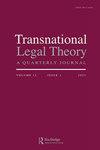COP26之后:评估跨国气候机制
Q2 Social Sciences
引用次数: 2
摘要
在我们撰写关于联合国气候变化缔约方大会(COP)26和跨国气候治理的特刊介绍时,距离格拉斯哥会议和最近在沙姆沙伊赫举行的COP27谈判又过去了一年。如果不将缔约方会议的状况视为一种治理方法,就不可能反思关键的评价以及贡献中所占的有限进展领域。为《联合国气候变化框架公约》(UNFCCC)成员国举办年度会议,就像气候变化方面的许多政治和法律行动模式一样,是一个多失败少成功的故事。周期性会议结构可能有助于2015年《巴黎协定》的制定,这是第一个为将全球变暖限制在最高2摄氏度的全球规范性要求制定的国际协定,该协定已成为迫使国家和私人行为者更快减排的成功诉讼的基础。然而,与此同时,这些会议往往会产生缺陷和协议,推迟而不是解决跨国气候治理面临的根本政治问题。与此同时,这些会议为包括气候领导者和落后者在内的公共和私人行为者提供了慷慨的宣传。这一结果呼应了格蕾塔·桑伯格对COP26的评价,是“对一切照旧的庆祝”等等,本文章由计算机程序翻译,如有差异,请以英文原文为准。
After COP26: Appraising the transnational climate regime
As we write this introduction to the special issue on the United Nations (UN) Climate Change Conference of Parties (COP) 26 and transnational climate governance, another year has passed since the conference in Glasgow and COP27 negotiations have recently taken place in Sharm El Sheikh. It is impossible to reflect on the critical evaluations as well as limited areas of progress accounted for in the contributions without considering the state of COP as a governance method. The hosting of annual conferences for members of the UN Framework Convention on Climate Change (UNFCCC) is, like many modes of political and legal action in climate change, a story of many failures and few successes. The cyclical meeting structure was likely instrumental to the forging of the 2015 Paris Agreement, the first international agreement to establish a global normative imperative for limiting global warming to maximum two degrees Celsius, which has gone on to serve as the foundation for successful litigation compelling states and private actors to reduce emissions more rapidly. Yet, at the same time, the conferences more routinely result in shortcomings and agreements that postpone, rather than resolve, the fundamental political questions facing transnational climate governance. At the same, the conferences provide public and private actors, including both climate leaders and laggards, with generous publicity. The result, echoing Greta Thunberg’s evaluation of COP26, is a ‘celebration of business as usual and blah,
求助全文
通过发布文献求助,成功后即可免费获取论文全文。
去求助
来源期刊

Transnational Legal Theory
Social Sciences-Law
CiteScore
2.10
自引率
0.00%
发文量
7
期刊介绍:
The objective of Transnational Legal Theory is to publish high-quality theoretical scholarship that addresses transnational dimensions of law and legal dimensions of transnational fields and activity. Central to Transnational Legal Theory''s mandate is publication of work that explores whether and how transnational contexts, forces and ideations affect debates within existing traditions or schools of legal thought. Similarly, the journal aspires to encourage scholars debating general theories about law to consider the relevance of transnational contexts and dimensions for their work. With respect to particular jurisprudence, the journal welcomes not only submissions that involve theoretical explorations of fields commonly constructed as transnational in nature (such as commercial law, maritime law, or cyberlaw) but also explorations of transnational aspects of fields less commonly understood in this way (for example, criminal law, family law, company law, tort law, evidence law, and so on). Submissions of work exploring process-oriented approaches to law as transnational (from transjurisdictional litigation to delocalized arbitration to multi-level governance) are also encouraged. Equally central to Transnational Legal Theory''s mandate is theoretical work that explores fresh (or revived) understandings of international law and comparative law ''beyond the state'' (and the interstate). The journal has a special interest in submissions that explore the interfaces, intersections, and mutual embeddedness of public international law, private international law, and comparative law, notably in terms of whether such inter-relationships are reshaping these sub-disciplines in directions that are, in important respects, transnational in nature.
 求助内容:
求助内容: 应助结果提醒方式:
应助结果提醒方式:


